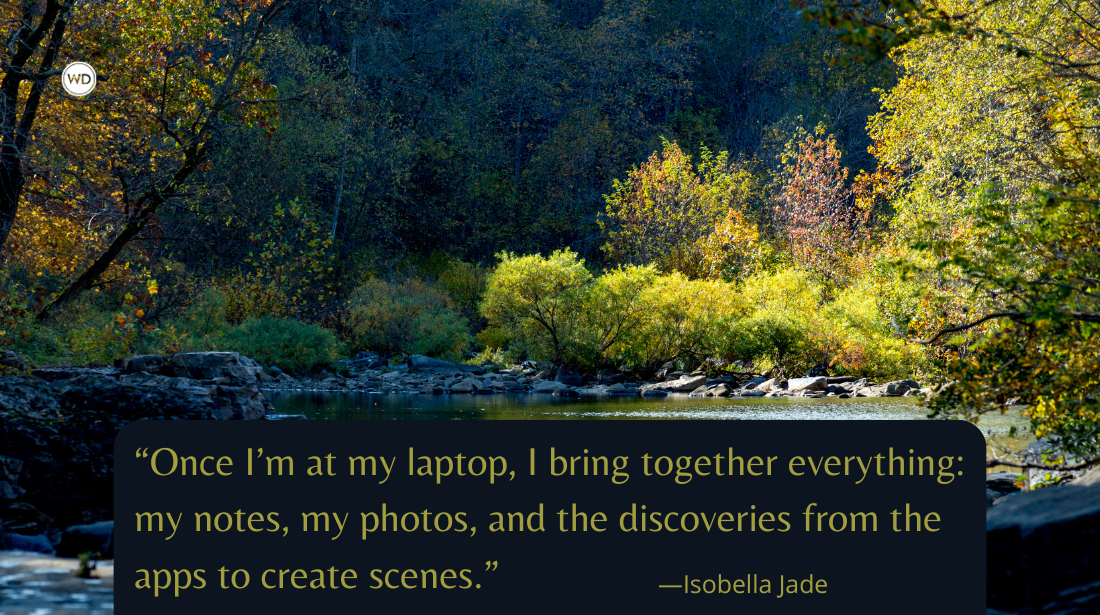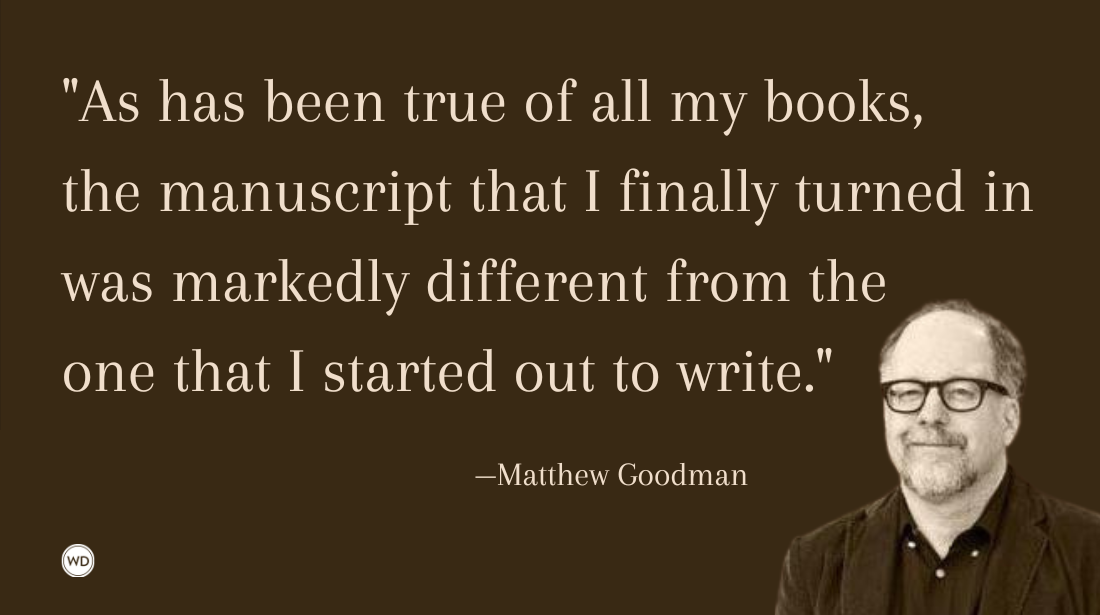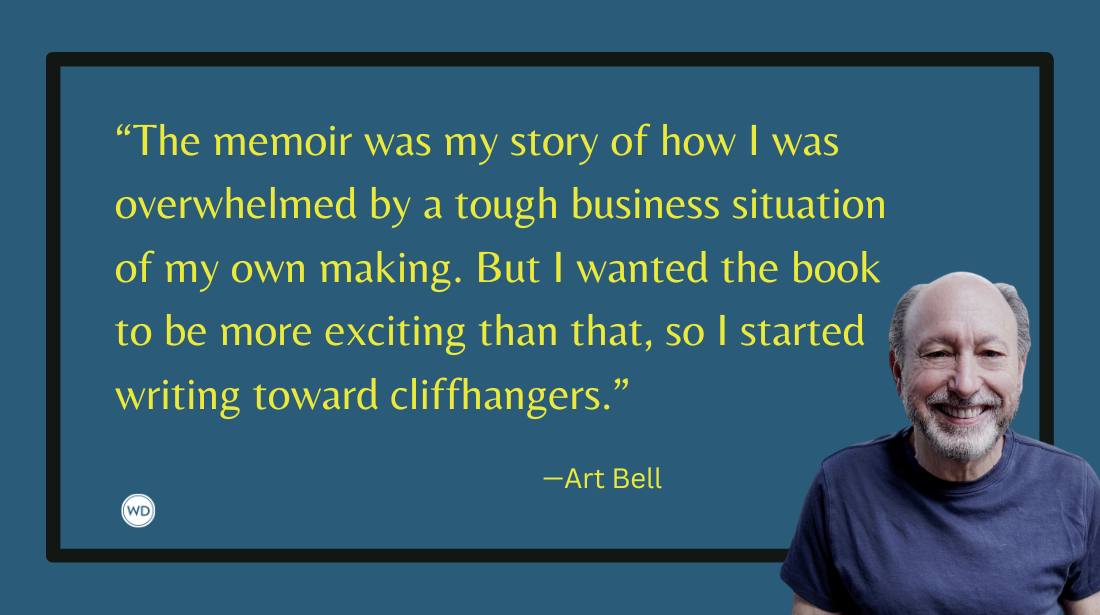Michelle Takes Manhattan
A writer makes the most of her grand prize from WD’s Annual Writing Competition as she hits New York City for back-to-back agent meetings. Was it worth the trip? Come along and find out.
It all started on Mother's Day 2003, when I locked myself in my bedroom. I told my two children: "If it's not on fire or bleeding from a major artery, I don't want to hear about it!"
While that's not the kind of message you'll read in a Hallmark card, I was desperate to do one thing on this holiday celebrating motherhood: write. I'd started a short story some time ago, a page or two, about a woman who'd do anything to protect her daughter.
I finished "A Mother Scorned" that same day. I e-mailed it to a few writer friends and was pleased when no one responded with, "Blech!" I read the story again, and again, and one more time, then I tweaked here and there and printed it out. I'd missed the first deadline to enter the 2003 Writer's Digest Annual Writing Competition, but those folks knew all about procrastinators like me—and offered an extended deadline. For an additional two bucks, I still had a shot.
Like most writers who enter the contest, I dreamed about winning the grand prize, about what I'd spend the money on and about the trip I'd take (see The Competition on Page 33). But c'mon—it was just a fantasy. I assumed my odds of winning were only slightly better than winning the lottery.
In late July 2003, I got a phone call from one of the editors at Writer's Digest. Here's how I remember the conversation:
Editor: Is this Michele Bardsley?
Michele: Yes.
Oh, crap. Something happened to my entry. It got shredded. It got wet. It got set on fire.
Editor: Hang on.
They hated my story and called to tell me to never, ever enter again.
Editor: OK, here it is.
I suck. I suck. I suck.
Editor: You've won the grand prize. Congratulations!
Michele: Huh?
My husband, Dean, was taking a nap—at least until I jumped on him and screamed. Once we established that the house was still standing, the kids were OK and I wasn't crazy, I told him the great news: We were going to New York City with WD Editor Kristin Godsey, and I'd get to meet with four A-list literary agents.
PAVING THE WAY
I lived the prepublished novelist's dream for a long, long time. I went to conferences and writing group meetings, joined a critique group, wrote pages and pages and pages, pitched to editors and agents, sent query letters and partials. And with every envelope I mailed, I hoped that this time, I'd sell.
I wanted people to read my stories, and I wanted to make money doing what I loved, so I eventually turned to alternative markets. I sold my first book in 1998 to electronic publisher Hard Shell Word Factory and, since then, I've sold several novels, novellas and short stories to independent presses.
I'm grateful for all my small-press successes. I loved every minute of being a published author, despite the lack of national distribution and the tiny paychecks. But I felt like I was trapped in a little lake, swimming in circles. I wanted to plunge into bigger waters.
For the last seven years, I'd unknowingly prepared for what awaited me in New York City. With every novel I wrote, I improved my craft and gained confidence in myself and my abilities. I researched the markets, knew the players in my genre and kept current on the trends and news in the romance industry. I learned how to promote, how to have a book event (never just a signing), how to get blurbs and how to write a media release. I gave interviews, workshops and online chats and attended conferences as a presenter.
A couple of weeks before my trip to Manhattan, I prepared a press kit and ordered copies of my latest romantic comedy, Wild Women. In the press kit, I put in lots of information: a one-page biography, a list of awards, book blurbs, review quotes, copies of articles I'd written for RT BOOKClub Magazine, a list of my works-in-progress, the updated partial for Sex, Doug and Rocky Road (my chick-lit book with which I hoped to land an agent), autographed bookmarks, a copy of my winning short story and whatever else of import I could cram into the plain, black folder. My goal was to show the agents that I knew how to promote, that I was an experienced writer, that I was prolific and that I was a worthwhile risk.
There are two things writers must have, but can't pack, for pitch sessions: knowledge and confidence. I knew the romance genre inside and out. I knew I could complete a book, sell it and promote it. I knew I could speak to one person or a group without stammering or getting too nervous. All these experiences were acquired by time, effort and diligence—gifts a writer can get only by writing, dreaming and persisting.
THE BIG APPLE, UNPEELED
In April 2004, eight months after I found out I'd won the grand prize, Dean and I were on our way to New York City.
My first appointment was with Stephanie Kip Rostan at the Levine Greenberg Literary Agency. I liked her immediately. She was friendly and down-to-earth. I felt very comfortable talking to her, too, and the hour-long interview whooshed by. I became particularly fond of Stephanie when she told me how much she liked the first 50 pages of Sex, Doug and Rocky Road and said, "I'd love to work with you." Later on, Kristin and I debated what she'd actually meant. (Was that a yes? I think it was a yes. Did you hear her say yes? Uh ... I'm not sure.)
Writers House was a brief walk from the Levine Greenberg offices. Amy Berkhower's office was large but cozy, with floor-to-ceiling bookshelves, divider walls made of stained glass and comfy furniture. As I perused the titles on the shelves, I have to admit my jaw dropped at all the familiar names, the toys (oh, the joys of licensing characters) and the books, books, books. Amy Berkhower is Nora Roberts' agent—Nora Roberts! One of the goddesses in the romance genre. I felt honored that Amy had agreed to meet with me, and I tried not to prostrate myself in Wayne-and-Garth fashion: I'm not worthy! I'm not worthy!
Amy told us that her assistant, Genevieve, had read Sex, Doug and Rocky Road and loved it. (Assistants are a writer's best friends.) Amy wasn't looking for new clients, but she wanted to give my materials to her partner, Jodi Reamer. Jodi was petite, energetic and very nice. She gave us a tour of Writers House, which was the former residence of John Jacob Astor. The whole experience at Writers House was wonderful.
My next appointment was with Jenny Bent at the Trident Media Group. The glass-and-chrome building looked like a place where a New York agent would wheel and deal. So did the lobby. And so did Jenny's office.
Jenny represents two of my favorite authors: Jill Connor Browne and Laurie Notaro. I'd been to Jenny's Web site numerous times and felt, given her penchant for taking on humorous works, we'd get along just fine.
Unfortunately, she wasn't sold on Sex, Doug and Rocky Road. She said I had a good voice and could write well, but she didn't see a market for the book. We had a good conversation, though, about numerous other subjects and, as she showed us out, she requested a partial of another book I'd mentioned and predicted that I was on the cusp of making it big.
My final meeting was with Miriam Goderich of the Dystel & Goderich Literary Agency. Miriam led us to her office—up a metal spiral staircase and into what had once been the attic of the building. Miriam's office was crowded with books and papers and stacks of manuscripts. By this time, I was comfortable talking about my books and my writing career. It helped that Miriam was so nice and seemed genuinely interested in what I had to say. She said she felt my book had an unfinished feel, but that I wrote well. Still, she seemed willing to consider my work and asked that I send her the sales numbers for my small-press books. Yikes.
After the interview was over, Kristin and I said our goodbyes. Spending time with Kristin had been fun, and her presence at the appointments made me feel less nervous. I promised I'd keep in touch, and then it was time to hail a taxi and go to the airport.
THE ONE
When I returned from New York, I spent a lot of time thinking about my experiences with the agents I'd met. They'd all been wonderful, but Stephanie Kip Rostan stood out from the rest. I felt the most comfortable with her, and she displayed the kind of enthusiasm necessary to sell my books.
My theory was that finding an agent was like Morpheus's search for Neo in The Matrix. You just know when it's "the one." But I still indulged in a long internal debate, several conversations with Dean and instant-messaging sessions with my best writing pals.
In the end, I went with my gut, and I e-mailed Stephanie.
She responded right away and suddenly, I had an agent. The contract came a week or so later, and the joy of adding "my agent" to every sentence possible didn't wear thin for a long time.
Two months after I signed with the Levine Greenberg Literary Agency, Stephanie sold one of my projects to New American Library and negotiated a very nice advance. I've since pummeled her with ideas, partials and e-mails, to which she always replies, "Don't worry. I'll keep you busy." It seems that I'm finally swimming in the big waters with a very wise lifeguard.
Being a writer is never easy. There are days when I can't put words to a page no matter how long I stare at the screen. There are days when my confidence can't survive another rejection. There are days I wonder why the hell I bother to start another novel.
Then there are days like the one in July 2003, when my love of writing and my faith in the ceaseless effort of storytelling were unexpectedly rewarded, and I found myself living the writer's dream.








